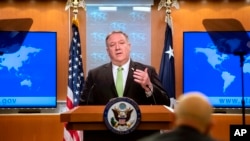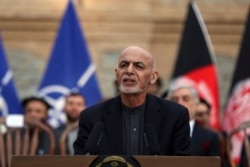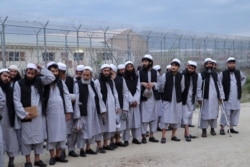U.S. Secretary of State Mike Pompeo has hailed the temporary Eid cease-fire in Afghanistan as a “tremendous opportunity” for advancing peace efforts in the war-torn country.
The Taliban insurgency announced the truce just hours before the three-day Eid al-Fitr festivities began Sunday, marking the end of the Islamic fasting month of Ramadan.
Afghan President Ashraf Ghani swiftly reciprocated by ordering government forces to cease fighting during the holiday and also “initiated a process” to release up to 2,000 Taliban prisoners.
“We worked hard to achieve this moment,” Pompeo said Sunday while welcoming the break in Afghan hostilities that have killed and injured hundreds of people in recent weeks.
The chief U.S. diplomat underlined the need for Afghan government and Taliban leaders to desist from escalating violence after Eid and instead expedite a prisoner swap to move urgently to intra-Afghan peace negotiations.
“Peace is the consistent and overwhelming desire of the Afghan people. We hope this ceasefire can build trust,” Pompeo said.
He emphasized the need for Ghani government to accelerate a prisoner swap with the Taliban, removing a remaining obstacle in the way to the proposed talks.
A landmark U.S.-Taliban agreement signed in February stipulated that Kabul would release up to 5,000 Taliban prisoners in return for 1,000 government security personnel held by the insurgents to build mutual confidence ahead of the dialogue
The Afghan government, however, released 1,000 insurgent inmates as of Sunday and the Taliban has freed about 300 detainees. Ghani and his aides have expressed concerns released insurgents would return to battlefield.
The Taliban, however, has dismissed those concerns.
"I expect the Taliban to adhere to their commitment not to allow released prisoners to return to the battlefield,” Pompeo said.
Taliban spokesman Suhail Shaheen welcomed as a “good step” the release of 2,000 insurgent prisoners by Kabul, saying his group is also committed to free government detainees. “This process should be completed in order to remove hurdles in the way of commencement of intra-Afghan negotiations and to pave the way for further progress which is to follow,” Shaheen emphasised in a tweet Sunday.
The proposed intra-Afghan talks, which were originally scheduled for March 10, would seek a permanent ceasefire and future power sharing arrangement in Afghanistan, say U.S. officials.
The U.S.-Taliban pact requires American and coalition troops to leave the country by mid-July 2021, ending the nearly 19-year-old Afghan war and America’s longest overseas military intervention.
In return, insurgent leaders have pledged to prevent terrorist groups from using Taliban-held areas for international terrorism and seek political reconciliation with fellow Afghans.
Pompeo said Sunday Washington remained committed to the implementation of the U.S.-Taliban accord and a joint declaration recently reached with Kabul to promote Afghan peace and security.
The Eid ceasefire is being widely praised by international partners of Afghanistan amid expectations it would lead to an end to years of bloodshed and enable health workers to effectively counter the coronavirus outbreak.
The pandemic has infected more than 10,500 people in Afghanistan and killed 218 others, though officials fear the actual numbers could be much higher.






